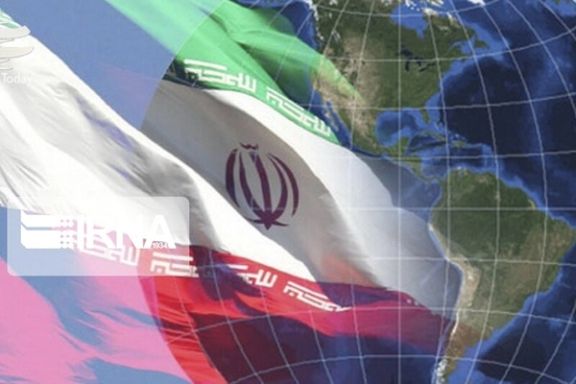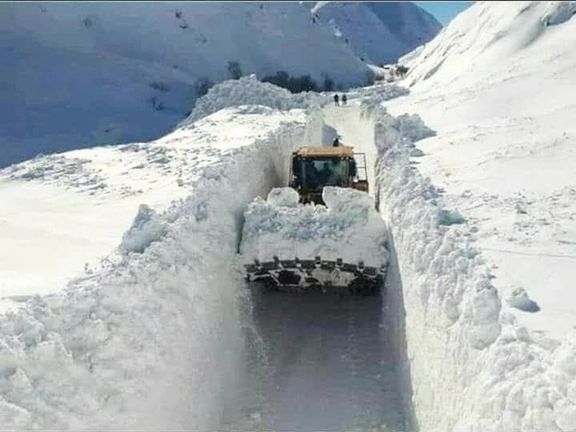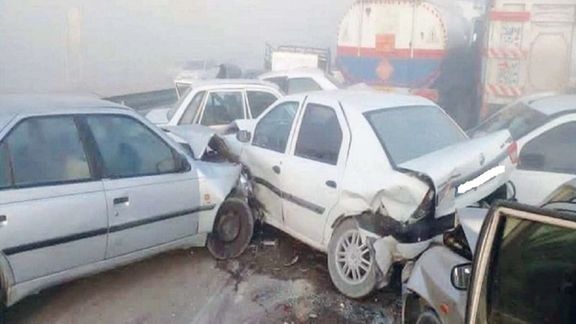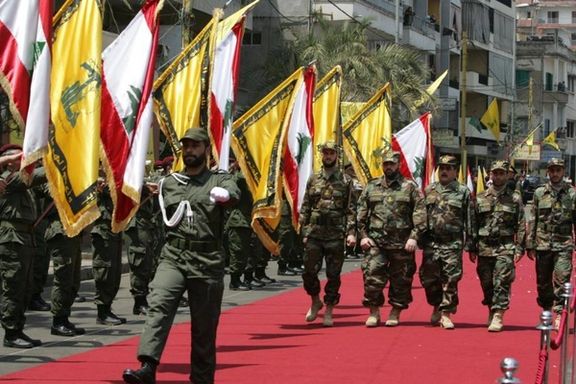Iran’s President Raisi Arrives In Moscow To Meet Putin

Iranian President Ebrahim Raisi has arrived in Russia for a two-day state visit upon an official invitation by President Vladimir Putin.

Iranian President Ebrahim Raisi has arrived in Russia for a two-day state visit upon an official invitation by President Vladimir Putin.
Before leaving Tehran for Moscow Wednesday morning, Raisi expressed hope that his visit could be a “turning point” in bilateral relations.
“Undoubtedly, we have good relations with all of our neighbors, particularly Russia, and considering the bilateral political, economic, and trade relations, this trip can be a turning point in our cooperation with Russia,” he said.
“The Iran-Russia collaboration in the region certainly creates security and will prevent unilateralism,” the Iranian president said.
Raisi is scheduled to hold a meeting with President Putin and deliver a speech at a plenary session of the Duma, the lower house of the Russian parliament during his trip.
Rejecting speculations that Raisi is going to Russia to ink the proposed 20-year agreement, Iran’s ambassador to Russia Kazem Jalali has said the two presidents may discuss and agree on different issues but signing deals is not on the agenda of the visit.
On Tuesday, the Russian Pacific Fleet announced it will take part in joint naval war games with Iran and China in without announcing the exact date and location for the drills.
Earlier in the week, Iran’s former ambassador to Russia said increasing banking cooperation between Tehran and Moscow can be used to circumvent United States’ sanctions.

Hardliner officials and media in Tehran say a new power triangle consisting of Iran, Russia and China has formed against the United States in the world.
"In the new world order, a triangle consisting of three powers – Iran, Russia, and China – has formed in Asia. This new arrangement heralds the end of the inequitable hegemony of the United States and the West," Mahmoud Abbaszadeh-Meshkini, spokesman of the National Security and Foreign Policy Committee of the Iranian parliament, said Wednesday.
In his interview with the government news agency IRNA, published as President Ebrahim Raisi was preparing to leave Tehran for an official visit to Moscow, Abbaszadeh-Meshkini also claimed that the Raisi administration has succeeded in turning Tehran into "the center of political and diplomatic consultations and arrangements in the region, Asia, and the world."
Khamenei's advisor Ali-Akbar Velayati also claimed in a recent interview that Iran has turned into a world power equal to Russia and China.
Raisi's visit to Moscow is taking place in an atmosphere of heightened public debateover Iran's now official policy of aligning with Russia and China against the West despite the once promoted "Neither East, Nor West" slogan of the founder of the Islamic Republic, Ayatollah Ruhollah Khomeini. The slogan has been inscribed over the entrance of the foreign ministry building in central Tehran.
Hardliners claim that closer economic and political relations with the East and Asian countries, which Iran's Supreme Leader Ali Khamenei has promulgated with the catchphrase "Looking East", will help Iran's development and strengthen it against Western powers, particularly the United States. Since 2018, and Khamenei's advocation of the policy, "Looking East" has become one of the centerpieces of a 'revolutionary economy' which hardliners have been hard at work to theorize and promote.
Hardliners accuse the former moderate president, Hassan Rouhani, and his reformist allies of sacrificing the potentials of expansion of relations with the East, Russia in particular, during the eight years of his presidency in favor of relations with Europe and the US.
In a note entitled "Expansion of Foundations of National Interests" Wednesday, Javan newspaper which is affiliated to the Revolutionary Guards (IRGC) alleged that Rouhani knowingly sabotaged relations with Moscow, cold-shouldered some of Putin's initiatives, and that his government never acted on the 15 cooperation agreements signed during his visit to Moscow in 2017.
"[President] Ebrahim Raisi's visit to Russia … can once again draw Tehran-Moscow relations out of a state of suspension and endow it with a strategic quality," Javan said of the importance of Raisi's visit.
Insisting that the Pentagon and liberals at home are worried about the visit, Javan added that "political conjunction with Russia and China" will elevate relations with the two Eastern powers from "seasonal and occasional" to a strategic level. "These developments in the Tehran-Beijing-Moscow axis will fundamentally change security arrangements in the region," Javan wrote.
In another article Wednesday, Javan said important economic agreements over a bilateral monetary arrangement to eliminate the need for going through the international banking system would be discussed with Russian officials.
Javan claimed that Raisi's visit, a few days after Foreign Minister Hossein Amir-Abdollahian's visit to Beijing, has born "tangible results in economic, political and social arenas" in the past few months and predicted that stronger relations with Russia will bear significant results in the process of the Vienna nuclear talks to restore the 2015 nuclear agreement with world powers and in neutralizing US sanctions.

Heavy rain and snow after months of drought have led to floods across Iran in the past week, causing deaths and damage to thousands of properties and roads.
According to reports, the southern regions of the country -- in Sistan-Baluchistan, Kerman, Fars and Hormozgan provinces -- are the worst hit by heavy rains, with higher number of casualties and villages that are left without power and surrounded with water.
Heavy snow, unprecedented in recent years, have chocked off mountain passes. Some areas are blanketed with six feet of snow.
Local authorities said on Wednesday that four people, including three children, were killed in floods in Kerman and Hormozgan provinces, dozens of villages were evacuated and access to more than 300 other villages was cut off.
There is no exact number for the casualties as many people are still missing and communication systems are lost in many of the flood-stricken areas, while relief operations are slow and insufficient. ()
Kerman Governor Ali Zeinivand said at a meeting of the province's crisis management taskforce on Wednesday that the situation in many towns and villages was critical as they are besieged by water, and unless precipitation decreases, flooding cannot be controlled.
Officials from different ministries and organizations, including President Ebrahim Raisi and several military commanders, have been paying visits to the people who are living in temporary housings.

Two massive multiple vehicle collisions in Iran’s southwest last week and the failure of the vehicles' airbags has caused public outrage at domestic automakers.
In comments in the days following the tragic accidents, chief of the Road Police Kamal Hadianfar said the airbags of all of the domestically produced vehicles had failed to operate and strongly criticized domestic automakers for the low quality of their products which he called "carriages of death".
Hadianfar demanded authorities to monitor the quality of domestically produced cars and implementation of safety and quality standards and said automakers sell their sub-standard products to people at the price of foreign-made vehicles.
Others, including Farhad Tamasebi, a member of the parliament's Industries and Mines Committee urged the Judiciary to launch an investigation into the failure of the airbags and the resignation or impeachment of the minister of industries.
The remarks of an official of the Automakers Association, Ahmad Nematbakhsh, about the failure of the airbags angered many including another road police official, Eynollah Jahani. Nematbakhsh claimed the airbags had not opened because the "the collisions' had impacted the rear of the vehicles".
"Sixty cars have collided and the airbags of none has opened because all of them were impacted from the rear?" Jahani asked and said automakers should try to improve the safety and quality of their products instead of trying to justify their shortcomings. He pointed out the failure of airbags and explosion of one of the vehicles involved in the collision were not isolated cases. "We witness similar technical defects and safety failures all the times," he said.
Iran has one of the world's worst traffic safety records with annual road fatalities of around 20,000.
Five were killed and tens were injured in the chain collisions on January 10 on the motorway connecting Behbahan and Ramhormoz in Khuzestan province that involved nearly sixty vehicles. Four of the vehicles burned to ashes in the accident.
Iran's quasi-government-owned automotive industry, the county’s largest after oil and gas, employs 700,000. It was valued in 2020 at $26.4 billion by India-based Modor Intelligence. The sector is in debt for billions of dollars and is a large burden for the government and its banks.
Road Police officials have repeatedly warned about inadequate safety standards of domestic cars. Speaking to the Iranian Students News Agency (ISNA) October 22, deputy chief oftraffic police, Taymour Hosseini, said road accidents were occurring due to inadequate safety standards as Iranian companies struggled to keep up with technology. "Big companies in the world are working on intelligent cars but we have dropped our expectations so much that we are happy with having anti-lock braking systems,” he said.
In a commentary Tuesday, the conservative Asr-e Iran news website said domestic automakers that are never held to account for the very low quality and safety standards of their products for many years have endangered the lives of tens of millions of Iranians with their unsafe products and dubbed the January 10 collisions automakers' "Behbahan Gate".
By protecting automakers' interests in many ways including by eliminating foreign competitors, Asr-e Iran said, the governments has become complicit in "murdering" innocent people. French companies
"It doesn't matter if reformists are in power or hardliners. Despite their political differences, when it comes to automakers, the knees [of both factions] give way and they relent [to automakers' wishes] as if they are under a spell," Asr-e Iran wrote and demanded "immediate shutdown" of the production lines of Saipa and Iran Khodro, Iran's two largest automakers, until the problem with airbags in their products is properly fixed.

The United States has sanctioned three individuals and their company with links to Iran-backed Hezbollah for exploiting Lebanon's economic resources for the benefit of the militant group.
The Treasury Department said in a statement on Tuesday that it has sanctioned Adel Diab, Ali Mohamad Daoun, and Jihad Salem Alame, as well as their Travel and Tourism company Dar Al Salam.
The Treasury added that all property owned by the three men and their business that is in the United States is blocked and that any transaction related to them is prohibited.
"Through businessmen like those designated today, Hezbollah gains access to material and financial support through the legitimate commercial sector to fund its acts of terrorism and attempts to destabilize Lebanon's political institutions," read the statement.
Earlier, the UAE asked the US to reclassify another Iran-backed group in the region as a terrorist group.
In a phone call with Secretary of State Tony Blinken, Emirati Foreign Minister Abdullah Bin Zayed requested that the Houthi movement - officially called Ansar Allah - be added to the list of terrorist organizations.
President Joe Biden reversed the Trump administration's decision to designate Houthis as terrorists less than a month after taking office, saying it hampered humanitarian aid to the Yemenis.
The UAE also vowed punishment for the Houthi missile and drone strike on key targets in the country that killed three and injured several others.

An Iranian lawmaker has said that the Islamic Republic should emulate China’s “success” in creating a unique national intranet to control the cyberspace.
Iran’s hardliner parliament has been discussing ways to intensify Internet censorship by establishing an intranet that would essentially ban foreign social media networks which allow Iranians to receive uncensored information and communicate with others.
The government has blocked thousands of websites in Iran for nearly 20 years both for ideological and political reasons. Almost all news and political websites not controlled by the government are inaccessible except by special software people need to use to get around the filtering.
Ali Yazdikhah, representing the capital Tehran, said on Tuesday that Iran should learn from China and Russia in restricting access to the Internet. His remarks came as Iran has signed a 25-year cooperation agreement with China and is expected to expand cooperation in many areas.
Facebook, You Tube and Twitter are also blocked. Instagram is the only major international platform still accessible, which Iranians use extensively to conduct ecommerce. This is one major impediment to parliament’s plan for shutting down all foreign social media networks.
Yazdikhah mentioned that plans call for free domestic intranet for users who have to pay to have access to foreign sites and platforms “without restriction”, but this is highly unlikely given the sensitivity of the clerical regime.